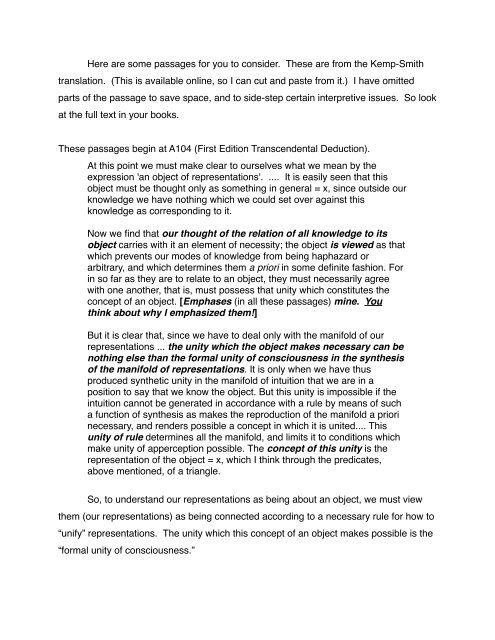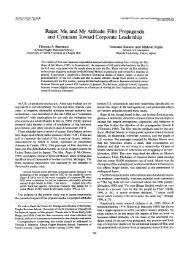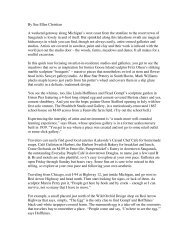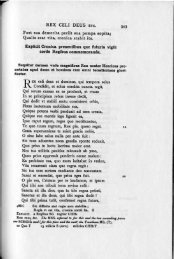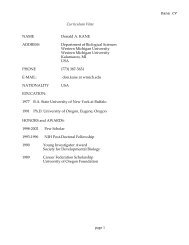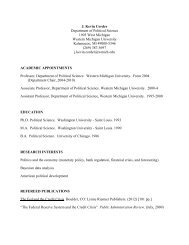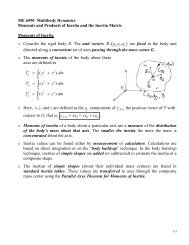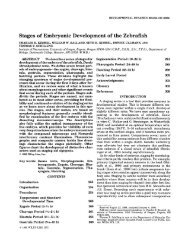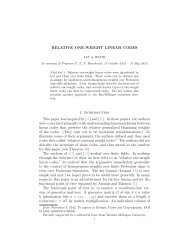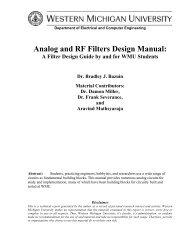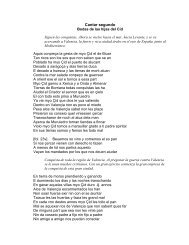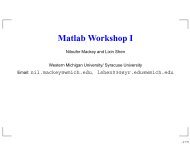Passages (mostly) from A Deduction
Passages (mostly) from A Deduction
Passages (mostly) from A Deduction
Create successful ePaper yourself
Turn your PDF publications into a flip-book with our unique Google optimized e-Paper software.
! Here are some passages for you to consider. These are <strong>from</strong> the Kemp-Smith<br />
translation. (This is available online, so I can cut and paste <strong>from</strong> it.) I have omitted<br />
parts of the passage to save space, and to side-step certain interpretive issues. So look<br />
at the full text in your books.<br />
These passages begin at A104 (First Edition Transcendental <strong>Deduction</strong>).<br />
At this point we must make clear to ourselves what we mean by the<br />
expression 'an object of representations'. .... It is easily seen that this<br />
object must be thought only as something in general = x, since outside our<br />
knowledge we have nothing which we could set over against this<br />
knowledge as corresponding to it.<br />
Now we find that our thought of the relation of all knowledge to its<br />
object carries with it an element of necessity; the object is viewed as that<br />
which prevents our modes of knowledge <strong>from</strong> being haphazard or<br />
arbitrary, and which determines them a priori in some definite fashion. For<br />
in so far as they are to relate to an object, they must necessarily agree<br />
with one another, that is, must possess that unity which constitutes the<br />
concept of an object. [Emphases (in all these passages) mine. You<br />
think about why I emphasized them!]<br />
But it is clear that, since we have to deal only with the manifold of our<br />
representations ... the unity which the object makes necessary can be<br />
nothing else than the formal unity of consciousness in the synthesis<br />
of the manifold of representations. It is only when we have thus<br />
produced synthetic unity in the manifold of intuition that we are in a<br />
position to say that we know the object. But this unity is impossible if the<br />
intuition cannot be generated in accordance with a rule by means of such<br />
a function of synthesis as makes the reproduction of the manifold a priori<br />
necessary, and renders possible a concept in which it is united.... This<br />
unity of rule determines all the manifold, and limits it to conditions which<br />
make unity of apperception possible. The concept of this unity is the<br />
representation of the object = x, which I think through the predicates,<br />
above mentioned, of a triangle.<br />
! So, to understand our representations as being about an object, we must view<br />
them (our representations) as being connected according to a necessary rule for how to<br />
“unify” representations. The unity which this concept of an object makes possible is the<br />
“formal unity of consciousness.”
All necessity, without exception, is grounded in a transcendental condition.<br />
There must, therefore, be a transcendental ground of the unity of<br />
consciousness in the synthesis of the manifold of all our intuitions, and<br />
consequently also of the concepts of objects in general, and so of all<br />
objects of experience, a ground without which it would be impossible to<br />
think any object for our intuitions; for this object is no more than that<br />
something, the concept of which expresses such a necessity of synthesis.<br />
This original and transcendental condition is no other than transcendental<br />
apperception. .... To render such a transcendental presupposition valid,<br />
there must be a condition which precedes all experience, and which<br />
makes experience itself possible.<br />
! We saw above that, in order to count as (constituting) representations of objects,<br />
our representations must be connected by a necessary rule for unifying them. The<br />
“unity” of this rule makes possible the “formal unity of consciousness.” In the next<br />
passage, we see that there must be a “transcendental ground” of this necessity. This<br />
transcendental ground or “condition” is then labeled “transcendental apperception.”<br />
There can be in us no modes of knowledge, no connection or unity of one<br />
mode of knowledge with another, without that unity of consciousness<br />
which precedes all data of intuitions, and by relation to which<br />
representation of objects is alone possible. This pure original<br />
unchangeable consciousness I shall name transcendental apperception.<br />
! This transcendental ground, called “transcendental apperception,” is now<br />
described as a “unity of consciousness” and as a “pure original unchangeable<br />
consciousness.”<br />
! There are lots of questions that can be asked about this “transcendental<br />
apperception.” It is described as a unity, as a single thing. But what is this “unity?” Is<br />
Kant’s claim that to be representations of an object, all these representations must “in” a<br />
single “mental container,” i.e., parts of one “transcendent mind” or “self-in-itself?” (Note<br />
I used the phrase “transcendent” mind, while Kant is talking about the unity of<br />
something “transcendental.” That is a hint as to my answer the question just<br />
asked.)!<br />
! Kant continues:
This transcendental unity of apperception forms out of all possible<br />
appearances, which can stand alongside one another in one experience, a<br />
connection of all these representations according to laws. For this unity of<br />
consciousness would be impossible if the mind in knowledge of the<br />
manifold could not become conscious of the identity of function<br />
whereby it synthetically combines it in one knowledge. The original and<br />
necessary consciousness of the identity of the self is thus at the<br />
same time a consciousness of an equally necessary unity of the<br />
synthesis of all appearances according to ... rules, which ...<br />
determine an object for their intuition, that is, the concept of something<br />
wherein they are necessarily interconnected. For the mind could never<br />
think its identity in the manifoldness of its representations, and<br />
indeed think this identity a priori, if it did not have before its eyes the<br />
identity of its act, whereby it subordinates all synthesis of apprehension<br />
(which is empirical) to a transcendental unity, thereby rendering possible<br />
their interconnection according to a priori rules.<br />
! I take this to mean that the necessary “unity” Kant calls “transcendental<br />
apperception” is the not the numerical unity of some “mind-in-itself” in which all these<br />
representations must be contained, but the unity of “function” by which it unifies these<br />
representations. What’s more, my awareness (or my potential awareness, as he will<br />
make clear in the B edition) of myself as a single subject of conscious experience would<br />
be impossible without the (potential) awareness of the unity of the rule of “object-hood”<br />
by which I synthesize a manifold of intuition into cognition of an object.<br />
! If you will, subjective identity both pre-supposes, and is pre-supposed by,<br />
objective uniformity. I think that this is what the following says:<br />
Since this unity must be regarded as necessary a priori ... the objective<br />
reality of our empirical knowledge, rests on the transcendental law, that all<br />
appearances ... must stand under those a priori rules of synthetical unity<br />
whereby the interrelating of these appearances in empirical intuition is<br />
alone possible. In other words, appearances in experience must stand<br />
under the conditions of the necessary unity of apperception, just as<br />
in mere intuition they must be subject to the formal conditions of space<br />
and of time. Only thus can any knowledge become possible at all.<br />
! So, this necessary unity of transcendental apperception leads to the possibility of<br />
synthetic a priori knowledge of appearances.<br />
! Now consider:
There is one single experience in which all perceptions are represented<br />
as in thoroughgoing and orderly connection, just as there is only one<br />
space and one time in which all modes of appearance and all relation of<br />
being or not being occur. When we speak of different experiences, we can<br />
refer only to the various perceptions, all of which, as such, belong to one<br />
and the same general experience. This thoroughgoing synthetic unity of<br />
perceptions is indeed the form of experience; it is nothing else than the<br />
synthetic unity of appearances in accordance with concepts.<br />
! Hmmm..... “One single experience?” Many, many time, I have asked myself,<br />
“Which one?” Hint: that wasn’t a helpful question.<br />
! Kant continues:<br />
!<br />
The a priori conditions of a possible experience in general are at the<br />
same time conditions of the possibility of objects of experience. Now<br />
I maintain that the categories, above cited, are nothing but the conditions<br />
of thought in a possible experience, just as space and time are the<br />
conditions of intuition for that same experience. They are fundamental<br />
concepts by which we think objects in general for appearances, and have<br />
therefore a priori objective validity. This is exactly what we desired to<br />
prove.<br />
! This may not help much yet. But he seems to be claiming that these rules for the<br />
synthesis of representations into cognition of an object are “a priori conditions for the<br />
possibility of experience.”<br />
! One last quote <strong>from</strong> this section, at A123, which I will simply leave for your<br />
consideration:<br />
The objective unity of all empirical consciousness in one consciousness,<br />
that of original apperception, is thus the necessary condition of all possible<br />
perception; and [this being recognized we can prove that] the affinity of all<br />
appearances, near or remote, is a necessary consequence of a synthesis<br />
in imagination which is grounded a priori on rules.<br />
So, the unity of transcendental apperception is the necessary condition for the “affinity<br />
of all appearances, near or remote ....”<br />
Towards the beginning of the B edition, we find the following, oft-quoted passage:<br />
It must be possible for the 'I think' to accompany all my representations;<br />
for otherwise something would be represented in me which could not be
thought at all, and that is equivalent to saying that the representation<br />
would be impossible, or at least would be nothing to me. ... [T]his<br />
representation is an act of spontaneity, that is, it cannot be regarded as<br />
belonging to sensibility. I call it pure apperception ... because it is that<br />
self-consciousness which ... must be capable of accompanying all<br />
other representations, and which in all consciousness is one and the<br />
same.... The unity of this apperception I likewise entitle the transcendental<br />
unity of self-consciousness, in order to indicate the possibility of a priori<br />
knowledge arising <strong>from</strong> it. For the manifold representations, which are<br />
given in an intuition, would not be one and all my representations, if they<br />
did not all belong to one self-consciousness. As my representations (even<br />
if I am not conscious of them as such) they must conform to the condition<br />
under which alone they can stand together in one universal selfconsciousness,<br />
because otherwise they would not all without exception<br />
belong to me. From this original combination many consequences follow.<br />
! Once again, it sounds like the “unity” he is talking about here is the unity of “box”<br />
in which all my representation must occur in order for them all to be my representations.<br />
I have already indicated I think that is not what he is saying.<br />
This thoroughgoing identity of the apperception of a manifold which is<br />
given in intuition contains a synthesis of representations, and is possible<br />
only through the consciousness of this synthesis. .... Only in so far,<br />
therefore, as I can unite a manifold of given representations in one<br />
consciousness, is it possible for me to represent to myself the identity of<br />
the consciousness in [i.e. throughout] these representations. In other<br />
words, the analytic unity of apperception is possible only under the<br />
presupposition of a certain synthetic unity.<br />
! Now, what is this “one consciousness?” My remarks above have already<br />
indicated the direction of my answer. The metaphysical identity or unity of my mind-initself<br />
is not something, for Kant, that I can know anything about. So it would be<br />
problematic were he claiming that a consciousness could never happen unless selfidentical<br />
mind-in-itself did certain sorts of things, or collected certain things inside itself.<br />
According to Kant, I know myself, like I know everything else, only as appearing. So, I<br />
can’t really know that I have a numerically identically self-in-itself synthesizing all these<br />
representations. And that, in a way, is the point: the identity or unity that Kant is talking<br />
about here is a unity within consciousness, not the unity of some hypothesized entity<br />
that is consciousness happens “in.”
! Finally, as to the “one experience” passage, I will leave you to think about this.<br />
But, I think, the unity of function by means of which I must unite representations must<br />
translate into the unity of the a priori laws that objects must be experienced as standing<br />
in.<br />
! Consciousness of unity (necessary for cognition of objects) requires (potential<br />
consciousness of the) unity of consciousness. But the only unity of consciousness<br />
(immanent within consciousness of objects) is the unity of the “rule” by which I<br />
synthesize the manifold of intuition into cognition of objects. A priori knowledge of what<br />
we call “laws of nature” is possible only because these laws stem <strong>from</strong> the necessary<br />
conditions for the possibility of experience. So, this unity of the rules for synthesis of a<br />
manifold into cognition of objects produces a unity of “laws of nature” that I can know a<br />
priori must apply to appearances.<br />
! So, I claim, this unity of self that Kant call the transcendental unity of<br />
apperception, makes itself manifest as the unity of world we experience, the unity of<br />
nature, i.e., the unity of laws of nature, or, finally, as the unity of science. Empirical<br />
objects that did not conform to the same laws of nature would be objects cognized<br />
through a different synthesizing function, i.e., by a numerically distinct transcendental<br />
apperception. That is, they would not be objects in my world. From “one single<br />
experience” we arrive at “one single nature!”


